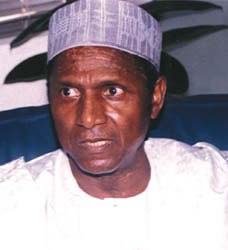MY ELECTION WAS RIGGED, SAYS YAR’ADUA
 |
|---|
Umaru Yar'Adua |
For the umpteenth time, President Umaru Yar’Adua on Tuesday in Abuja admitted that the nation’s electoral process including that which brought him to power was lacking in credibility and that elections fell short of international standards.
Looking directly at the newly inaugurated 22-man electoral reform committee members, Yar’Adua stated that the April elections were massively rigged.
“The April elections were so heavily marred by vote-rigging that European Union observers said they fell far below basic international standards and were not credible,” he said.
The president, speaking at the inauguration of a 22-man electoral reform committee at the State House, asked the body to get the cloak of incredibility off governments emerging from the electoral process by fashioning a method for the emergence of a truly independent electoral commission, with administrative and financial autonomy.
The president noted that, “despite the consensus by Nigerians that democracy is the best form of government, our inability to have elections that are internationally accepted and credible has left a credibility problem for our electoral process.
“I would advise that you focus for now on aspects of your assignment that would not be construed as being prejudicial to any ongoing election petition matters,” the president said.
He added that the shortcomings in the electoral process “have put a heavy burden upon us to evolve a means of endowing the electoral process with the highest internationally acceptable quality and standard.”
The president also agreed with major stakeholders’ call for the resolution of disputes arising from elections before winners take the oath of office, while urging the committee to evolve a “practical roadmap to laying a solid foundation for the growth and consolidation of democracy” in the country.
Yar’Adua rejected the opposition calls to cancel the result and hold them again, saying he believed he had the mandate of the Nigerian people. He promised to let tribunals probe abuses without interference.
The committee, which is chaired by the former Chief Justice of Nigeria, Justice Mohammed Uwais, has 12 months within which to submit its report to the Federal Government.
advertisement
|
|---|
In a six-point terms of reference for the committee, Yar’Adua urged them to look at all the issues and laws that have bearing on the country’s electoral process and make recommendations to government.
He specifically asked the committee to “make general and specific recommendations (including but not limited to constitutional and legislative provisions and/or amendments) to ensure a “truly Independent Electoral Commission imbued with administrative and financial autonomy.”
Yar’Adua charged the members to be dispassionate in their assignment, enjoining them “to look dispassionately at our peculiarities, specificities, historical experience, and those enduring dynamics which define us as a nation in arriving at decisions.”
He noted that if the nation was able to achieve this feat, “we would then have anchored our democratic culture firmly with everlasting peace, security and political stability. This would enable us to turn our collective energy and effort to developing our nation from its current state of under-development to join the league of developed nations.”
Responding, chairman of the committee, Justice Uwais, thanked the president for giving members the opportunity to serve the nation and promised not to disappoint the president and the nation.
He noted that the country could only forge a genuine democracy if it was able to “foster a democratic culture and the rule of law in holding democratic elections. Elections provide a peaceful democratic means for societies to channel competition for political powers and make collective decisions. There cannot be any doubt whatsoever that those elections are essential to democracy and to legitimate government.
“There must be the right and opportunity for citizens to choose a candidate. There must be the freedom of assembly, the freedom of association and movement and freedom of speech for candidates, parties, voters, media, observers and others. The political environment should also be free of intimidation. Such freedoms are together an essential precondition to meaningful election.”